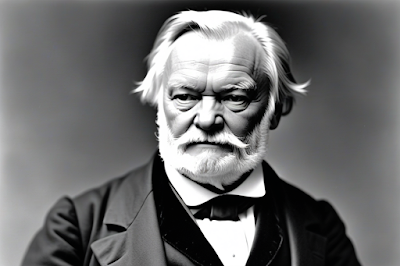"People do not lack strength, they lack will." - Victor Hugo.
"강인함이 부족한 것이 아니라 의지가 부족한 것이다." - 빅토르 위고.

The Power of Will: Victor Hugo's Timeless Insight
Victor Hugo, the renowned French writer, once said, "People do not lack strength, they lack will." This profound statement encapsulates a fundamental truth about human nature and personal achievement. Let's explore the depth and implications of this powerful quote.
빅토르 위고, 유명한 프랑스 작가는 "강인함이 부족한 것이 아니라 의지가 부족한 것이다."라고 말했습니다. 이 심오한 진술은 인간의 본성과 개인의 성취에 대한 근본적인 진실을 담고 있습니다. 이 강력한 인용구의 깊이와 의미를 탐구해 봅시다.
Understanding the Quote
Hugo's words suggest that human potential is not limited by physical or mental capabilities, but rather by the strength of one's determination. This idea challenges the common excuse that we lack the necessary resources or abilities to achieve our goals. Instead, it places the responsibility squarely on our willingness to persevere and push through obstacles.
위고의 말은 인간의 잠재력이 신체적 또는 정신적 능력에 의해 제한되는 것이 아니라 개인의 결단력의 강도에 의해 결정된다는 것을 시사합니다. 이 아이디어는 우리가 목표를 달성하는 데 필요한 자원이나 능력이 부족하다는 흔한 변명에 도전합니다. 대신, 이는 장애물을 극복하고 나아가려는 의지에 전적으로 책임을 지우고 있습니다.
The Nature of Will
Will, in this context, refers to the mental faculty that enables us to make decisions and commit to actions. It's the driving force behind our ability to set goals, overcome challenges, and persist in the face of adversity. Unlike physical strength, which has natural limits, willpower can be cultivated and strengthened over time through practice and discipline.
이 맥락에서 의지란 우리가 결정을 내리고 행동에 전념할 수 있게 하는 정신적 능력을 말합니다. 이는 목표를 설정하고, 도전을 극복하며, 역경 속에서도 지속할 수 있는 능력의 원동력입니다. 자연적 한계가 있는 신체적 힘과 달리, 의지력은 시간이 지남에 따라 연습과 훈련을 통해 계발되고 강화될 수 있습니다.
The Illusion of Lack
Often, when we say we lack strength, what we really mean is that we lack the will to push ourselves beyond our perceived limits. This misconception can lead to a self-fulfilling prophecy where we fail to attempt challenging tasks because we believe we're not capable. Hugo's quote encourages us to recognize that our true limitations are often self-imposed.

우리가 힘이 부족하다고 말할 때, 실제로 우리가 의미하는 것은 우리가 인식하는 한계를 넘어서려는 의지가 부족하다는 것입니다. 이러한 오해는 우리가 능력이 없다고 믿기 때문에 도전적인 과제를 시도조차 하지 않는 자기 충족적 예언으로 이어질 수 있습니다. 위고의 인용구는 우리의 진정한 한계가 종종 스스로 부과한 것임을 인식하도록 격려합니다.
The Role of Willpower in Success
History is replete with examples of individuals who achieved greatness not because they were the strongest or most talented, but because they possessed an indomitable will. From inventors who persisted through countless failures to athletes who pushed their bodies to the limit, the common thread is an unwavering determination to succeed.
역사는 가장 강하거나 재능 있어서가 아니라 불굴의 의지를 가졌기 때문에 위대함을 달성한 개인들의 예로 가득합니다. 수많은 실패를 겪으면서도 끈질기게 노력한 발명가들부터 자신의 신체를 한계까지 밀어붙인 운동선수들까지, 공통점은 성공하고자 하는 흔들림 없는 결의입니다.
Cultivating Will
Developing a strong will is a process that requires consistent effort and self-reflection. It involves setting clear goals, breaking them down into manageable steps, and committing to regular action. Mindfulness practices, such as meditation, can help strengthen our ability to focus and resist distractions. Additionally, surrounding ourselves with supportive individuals and environments can reinforce our determination.
강한 의지를 기르는 것은 지속적인 노력과 자기 성찰이 필요한 과정입니다. 이는 명확한 목표를 설정하고, 그것을 관리 가능한 단계로 나누며, 정기적인 행동에 전념하는 것을 포함합니다. 명상과 같은 마음챙김 연습은 집중력을 강화하고 방해를 견디는 능력을 향상시킬 수 있습니다. 또한, 지지적인 개인들과 환경으로 자신을 둘러싸는 것은 우리의 결의를 강화할 수 있습니다.
Overcoming Obstacles
When faced with challenges, it's easy to attribute our struggles to a lack of ability or resources. However, Hugo's quote reminds us that the most significant barrier is often our own reluctance to push through discomfort. By reframing obstacles as opportunities to strengthen our will, we can approach difficulties with a more empowering mindset.
도전에 직면했을 때, 우리의 어려움을 능력이나 자원의 부족으로 돌리기 쉽습니다. 그러나 위고의 인용구는 가장 큰 장벽이 종종 불편함을 견디려는 우리 자신의 주저함이라는 것을 상기시킵니다. 장애물을 우리의 의지를 강화할 기회로 재해석함으로써, 우리는 더 강력한 마음가짐으로 어려움에 접근할 수 있습니다.
The Ripple Effect of Strong Will
A strong will not only benefits the individual but can also inspire and motivate others. When we demonstrate unwavering commitment to our goals, it sets an example for those around us. This ripple effect can create a culture of determination and resilience, leading to collective growth and achievement.

강한 의지는 개인에게 이익이 될 뿐만 아니라 다른 사람들에게 영감을 주고 동기를 부여할 수 있습니다. 우리가 목표에 대한 흔들림 없는 헌신을 보여줄 때, 그것은 주변 사람들에게 본보기가 됩니다. 이러한 파급 효과는 결단력과 회복력의 문화를 만들어 집단적 성장과 성취로 이어질 수 있습니다.
Conclusion
Victor Hugo's assertion that "People do not lack strength, they lack will" serves as a powerful reminder of the untapped potential within each of us. By recognizing the primacy of will in achieving our goals, we can shift our focus from perceived limitations to the cultivation of unwavering determination. As we strengthen our will, we not only expand our own capabilities but also inspire those around us to do the same.
"강인함이 부족한 것이 아니라 의지가 부족한 것이다."라는 빅토르 위고의 주장은 우리 각자 안에 있는 미개발된 잠재력을 강력하게 상기시킵니다. 목표 달성에 있어 의지의 중요성을 인식함으로써, 우리는 인식된 한계에서 흔들림 없는 결의의 함양으로 초점을 옮길 수 있습니다. 우리의 의지를 강화함으로써, 우리는 자신의 능력을 확장할 뿐만 아니라 주변 사람들도 같은 일을 하도록 영감을 줍니다.
